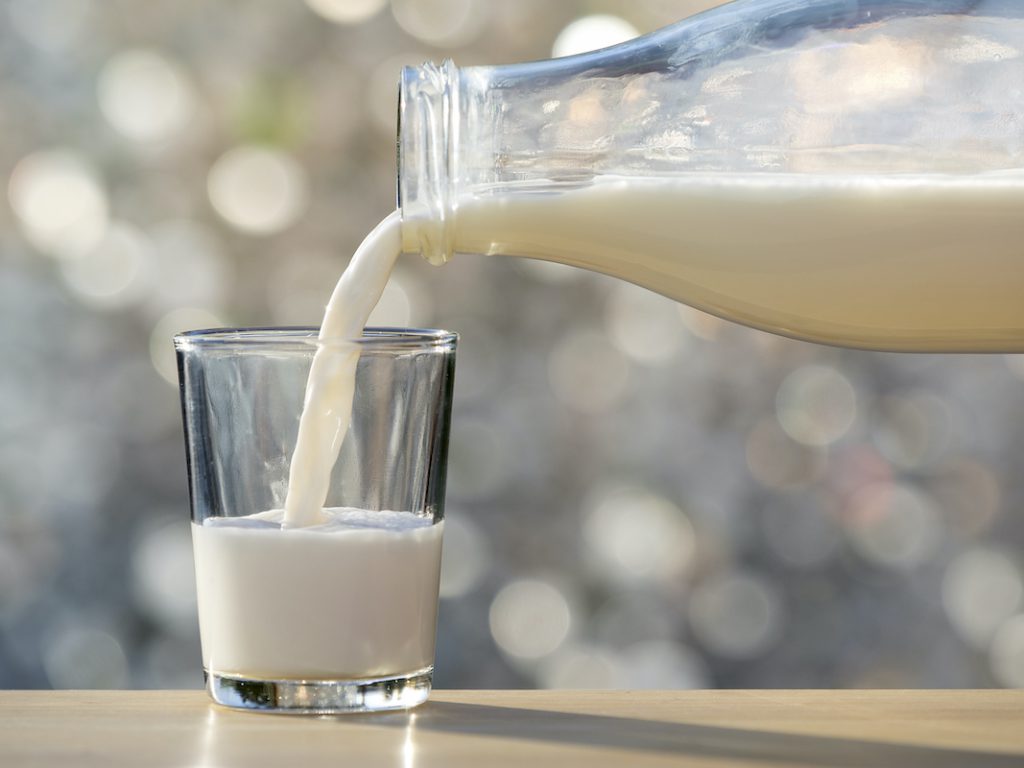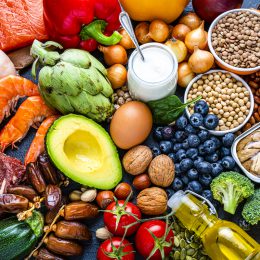Leche de vaca, de avena, de almendras y otras: ¿cuál es la mejor leche para usted?
Registered dietitians discuss the pros and cons of five common types of milk.

Not too long ago, the only decision you had to make in the milk aisle was whole milk, 2 percent, 1 percent, or skim (fat-free). Now you have a slew of choices, from traditional cow's milk to a seemingly endless lineup of plant-based alternatives, such as soy, almond, snd oat milk.
Yet even with all these options, about 90 percent of Americans don’t get the recommended three servings of dairy per day, according to the Dietary Guidelines for Americans. The guidelines specify that cow’s milk and soy milk are considered part of the dairy group, but other plant-based beverages are not, “because their overall nutritional content is not similar to dairy milk and fortified soy beverages.”
Does that mean plant-based milks are an inferior choice? Not exactly. There's not one best milk for everyone - rather, the best choice for you depends on your preferences and nutritional needs.
Maybe you want a low-calorie option. Maybe lactose upsets your stomach. Maybe you're a vegan. Or maybe you need to up the protein or calcium in your diet. Any of these things may play into your decision, but there are two guiding principles that apply to all milk drinkers:
- The best option is usually the one that you’re going to drink or eat consistently, says Colleen Christensen, a registered dietitian nutritionist based in Grand Rapids, Michigan, and founder of Colleen Christensen Nutrition. So instead of choosing what you think you should drink, choose what you really will drink.
- Older adults should look for milk that’s a good source of protein, potassium, calcium, vitamin D, and vitamin B12, says Angel Planells, M.S., R.D.N., a spokesperson for the Academy of Nutrition and Dietetics. These vitamins and minerals help older adults maintain a healthy weight, strong bones, and lower blood pressure.
Cow's milk is a natural source of calcium, vitamin B12, and potassium. Plus, it's fortified with vitamin D. Most plant-based alternatives are fortified with some combination of vitamins and minerals, but the amounts vary by brand, so it's important to look at the nutrition labels.
Here, we compare five of the most common milk options on the market. You’ll see nutritional information for the average 1-cup serving of each, including the percentage of the recommended daily value (DV) of key vitamins and minerals for adults over 51, plus a few pros and cons you should know. Our goal: to take the guesswork out of the (non)dairy aisle.
Milk #1: Cow’s Milk (Whole)
Nutritional information for 1 cup:
- Calories: 152
- Total fat: 8 grams (4.6 grams saturated fat)
- Total carbohydrates: 11.5 grams
- Protein: 8 grams
- Calcium: 306 milligrams (25.5 percent DV)
- Vitamin D: 2.39 micrograms (16 percent DV)
- Vitamin B12: 0.54 micrograms (22.5 percent DV)
- Potassium: 374 milligrams (11 percent DV for men, 14 percent DV for women)
Pros: “Cow’s milk is the most ‘complete’ of all milks, providing a mix of macronutrients, including carbs, fat, and protein,” Christensen says. “This variety of nutrients allows for this milk to help sustain your body, usually for longer periods of time.”
It’s a great source of high-quality protein, and it’s naturally high in calcium and B vitamins. “I always recommend going to cow’s milk first,” says Katie Dodd, M.S., R.D.N., founder of the Geriatric Dietitian. “For people who are lactose intolerant or don’t like drinking milk, fortified plant-based beverages are your next best option.”
Another perk to consider: Cow’s milk is often cheaper than plant-based beverages.
Cons: Whole milk is high in saturated fat and cholesterol. If you have high cholesterol, choose low-fat (1 percent) or fat-free (skim) options over whole.
Additionally, more than 65 percent of the world's population is lactose intolerant, according to the National Institute of Diabetes and Digestive and Kidney Diseases. For those people, cow's milk can lead to digestive issues, including bloating and diarrhea.
“Lactose intolerance doesn’t mean you have to give up all milk products,” says Toby Amidor, M.S., R.D., author of The Family Immunity Cookbook. “If milk or cheese really bothers you, for example, see how you do with Greek yogurt, which has less lactose per serving.”
Milk #2: Soy Milk
Nutritional information for 1 cup:
- Calories: 110
- Total fat: 4.5 grams (0.5 grams saturated fat)
- Total carbohydrates: 9 grams
- Protein: 8 grams
- Calcium: 450 milligrams (30 percent DV)
- Vitamin D: 3 micrograms (15 percent DV)
- Vitamin B12: 3 micrograms (120 percent DV)
- Potassium: 380 milligrams (9 percent DV for men, 11 percent for women)
Pros: Soy milk is usually considered the runner-up to cow’s milk. It’s an especially good option for older adults, since — like cow’s milk — it contains high-quality protein, but it lacks the saturated fats, cholesterol, and sugars, says Chrissy Arsenault, a Colorado-based registered dietitian nutritionist and founder of the Pink Pamplemousse. It’s also a good source of potassium and is often fortified with calcium and vitamins D and B12.
Cons: Dietitians agree that there aren’t major downsides to soy milk. Soy is a common allergen, so you may need to avoid it if that applies to you. Additionally, soy may not be the best choice for people with thyroid disorders because it may interfere with common treatments for hypothyroidism, Arsenault says. If in doubt, talk to your doctor before you try it.
Milk #3: Oat Milk
Nutritional information for 1 cup:
- Calories: 120
- Total fat: 5 grams (0.5 grams saturated fat)
- Total carbohydrates: 16 grams
- Protein: 3 grams
- Calcium: 350 milligrams (25 percent DV)
- Vitamin D: 3.6 micrograms (20 percent DV)
- Vitamin B12: 1.2 micrograms (50 percent DV)
- Potassium: 390 milligrams (11 percent DV for men, 15 percent DV for women)
Pros: Oat milk is a great option for people with milk and nut allergies who are looking for a dairy alternative. It’s also low in saturated fat and has no cholesterol.
“Another benefit of oat milk is that is has beta-glucan, a form of dietary fiber in oats that’s linked to lowering cholesterol and stabilizing blood sugar levels,” Planells says. In fact, one study published in the Annals of Nutrition and Metabolism found that men who drank about 3 cups (750 milliliters) of oat milk daily for five weeks reduced their total blood cholesterol by 3 percent and “bad” LDL cholesterol by 5 percent.
Cons: Brands fortify oat milk with vitamins and protein, so the amount can vary greatly from brand to brand. Some also sneak in added sugars. Therefore, it’s especially important to look at the nutrition label.
In general, oat milk has less than half as much protein as cow’s milk, so it won’t keep you feeling full as long.
Milk #4: Almond Milk (Unsweetened)
Nutritional information for 1 cup:
Suscríbase a nuestro boletín informativo
Es rápido y fácil: Usted podría estar entre las 13 millones de personas elegibles.
¿Ya es miembro? Haga clic para descubrir nuestros más de 15,000 centros participantes.
Síganos
- Calories: 30
- Total fat: 2.5 grams (0 grams saturated fat)
- Total carbohydrates: 1 gram
- Protein: 1 gram
- Calcium: 450 milligrams (30 percent DV)
- Vitamin D: 2.5 micrograms (10 percent DV)
- Vitamin B12: 0 micrograms (0 percent DV)
- Potassium: 170 milligrams (5 percent DV for men, 6 percent DV for women)
Pros: Unsweetened almond milk is low in calories, fat, and carbs. That makes it a great option for those looking to lose weight or anyone following a lower-carb diet (just make sure you choose an unsweetened brand).
Cons: The fact that almond milk is low in calories is a benefit for some, but it could be a concern for others, especially older adults who want to maintain or gain weight. Almond milk is also low in protein, vitamin B12, and potassium — three nutrients you find in most other milks.
“I actually think almond milk is more comparable to water in terms of nutrition than it is to milk,” Christensen says.
Milk #5: Coconut Milk Beverage (Not Canned)
Nutritional information for 1 cup:
- Calories: 45
- Total fat: 4 grams (3.5 grams saturated fat)
- Total carbohydrates: 2 grams
- Protein: 0 grams
- Calcium: 130 milligrams (10 percent DV)
- Vitamin D: 2.5 micrograms (10 percent DV)
- Vitamin B12: 3 micrograms (120 percent DV)
- Potassium: 40 milligrams (1 percent DV for men, 2 percent DV for women)
Pros: Most coconut milk that is packaged in cartons, not cans, is blended with water to give it a consistency similar to cow’s milk. It has a pleasant flavor and is very versatile: You can enjoy it straight from a glass, blended into smoothies, or used in soups and curries in place of thicker (and higher fat) canned versions.
Coconut milk is often fortified with nutrients to make it a good source of calcium and vitamins D and B12.
Cons: When you think of coconut milk, the canned version may come to mind first, but that has a very different nutritional profile and is usually used for baking or cooking. It’s also very high in fat and calories (445 calories and 48 grams of fat per cup), so it should be used in moderation.
In this case, we’re focused on coconut milk drinks, which still have a few downsides to consider: First, coconut milk beverages contain less protein than cow’s milk and most of the other milks on this list, so it’s important to incorporate protein from other sources into your diet, Christensen says.
Second, coconut milk naturally contains more saturated fat than you'd get from other milks. If your doctor has recommended that you watch your cholesterol level, it might not be the best choice.
Verifique su elegibilidad para SilverSneakers al instante
Los miembros de SilverSneakers pueden visitar miles de gimnasios y centros de fitness en todo el país, además de asistir a las clases SilverSneakers en línea EN VIVO, diseñadas para adultos mayores de todos los niveles. If you have a Medicare plan, it may include SilverSneakers — at no additional cost. Check your eligibility instantly here.
¿No es elegible para SilverSneakers? Todavía puede obtener más de 200 videos gratis de SilverSneakers On-Demand y mantenerse en contacto con nosotros creando su cuenta online.




